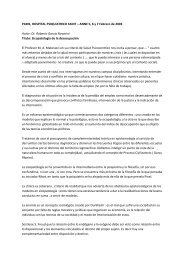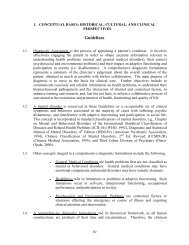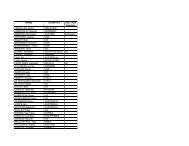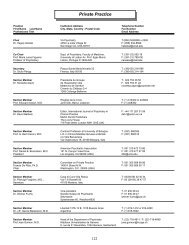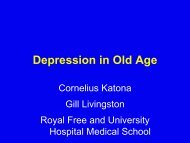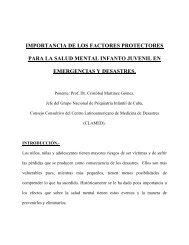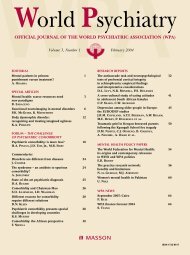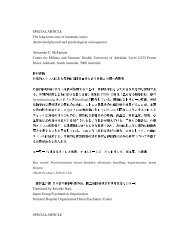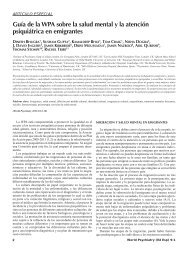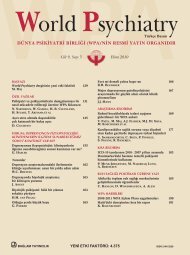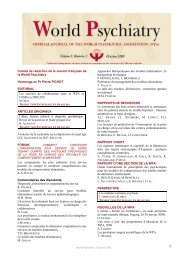ABSTRACTS - World Psychiatric Association
ABSTRACTS - World Psychiatric Association
ABSTRACTS - World Psychiatric Association
Create successful ePaper yourself
Turn your PDF publications into a flip-book with our unique Google optimized e-Paper software.
US19.<br />
ADVANCES IN THE MANAGEMENT<br />
OF TREATMENT-RESISTANT PSYCHOTIC<br />
DISORDERS<br />
US19.1.<br />
NEW APPROACHES IN THE TREATMENT<br />
OF REFRACTORY SCHIZOPHRENIA<br />
H.-J. Möller<br />
Department of Psychiatry, University of Munich, Germany<br />
About 10-30% of patients with schizophrenia have little or no<br />
response to antipsychotic medication and up to an additional 30%<br />
have partial response. Reasons for treatment resistance are amongst<br />
others wrong diagnosis, suboptimal dose and duration of antipsychotic<br />
treatment, poor or non-adherence, unresponsiveness to a special<br />
antipsychotic in the individual case, neurobiological factors,<br />
comorbidity. Since long time clozapine has been the treatment of<br />
choice for patients with drug refractory schizophrenia. Other second<br />
generation antipsychotics (SGAs) have not proved to be as effective<br />
in refractory patients as clozapine, a view which was also supported<br />
by the respective phase of the CATIE trial. There is very limited evidence<br />
for the efficacy of combining antipsychotics in refractory schizophrenia,<br />
although this seems to be theoretically meaningful under<br />
certain pharmacological considerations: e.g., the combination of a<br />
multi-receptor SGA with a soft D2 receptor blocker. There is also limited<br />
evidence of the usefulness of augmentation with mood stabilizers.<br />
Possibly the best data are available for lamotrigine as an adjunctive<br />
treatment. Patients with excited, anxious and catatonic features<br />
might profit from the adjunctive use of benzodiazepines. Patients<br />
with persistent negative symptoms may benefit by a comedication<br />
with antidepressants. Also glutamatergic drugs have proven, however<br />
inconsistently, to be beneficial. As far as cognitive disturbances are<br />
concerned, comedication with cognitive enhancers/antidementia<br />
drugs appears meaningful. However, the results of several randomised<br />
studies are inconsistent. In very severe cases of drug refractory<br />
schizophrenia, electroconvulsive therapy is applied in some clinical<br />
settings, although there is only limited evidence in this respect.<br />
Based on the available evidence, the treatment programme has to be<br />
tailored to the needs of the individual patient. Pharmacogenetics<br />
might support this individual tailoring in the future. Although there<br />
are several new antipsychotics in the pipeline, there are currently no<br />
hints whether this problem will be overcome.<br />
US19.2.<br />
POTENTIAL FOR ENHANCING OUTCOMES<br />
IN TREATMENT-RESISTANT SCHIZOPHRENIA<br />
PATIENTS: THE ROLE OF ADJUNCTIVE<br />
MEDICATIONS<br />
W.W. Fleischhacker<br />
Department of Biological Psychiatry, Medical University<br />
of Innsbruck, Austria<br />
Managing treatment-resistant schizophrenia patients remains a huge<br />
challenge to the field. Among the various treatment options,<br />
polypharmacy is the most commonly used and least well researched<br />
strategy. The choice of adjunctive medication will depend on the target:<br />
patients whose positive symptoms do not adequately respond to<br />
antipsychotic monotherapy will most likely be managed differently<br />
than those for whom additional improvement in negative symptoms<br />
or cognitive function is sought. The spectrum of add-on medications<br />
ranges from adding benzodiazepines, antidepressants and mood stabilizers<br />
to combining two or three different antipsychotics. The available<br />
evidence supporting any of these options is very weak. Recently<br />
experimental agents, such as glutamatergic and nicotinergic drugs,<br />
have been explored in an attempt to establish a rational polypharmacy.<br />
As major breakthroughs have not been made, the clinician is still<br />
left with the responsibility to choose among the available options,<br />
often on a trial and error basis.<br />
US19.3.<br />
RELEVANCE AND TREATMENT OF NEGATIVE<br />
SYMPTOMS IN SCHIZOPHRENIA<br />
A.C. Altamura, G. Colombini, B. Dell’Osso<br />
Department of Psychiatry, University of Milan, Italy<br />
Among the different dimensions of schizophrenia, negative symptoms<br />
represent core features of the illness and reflect a reduction or<br />
loss of normal cognitive and emotional functioning that includes flattened<br />
affect, impoverished speech, apathy, avolition, anhedonia, asociality,<br />
psychomotor retardation and impaired attention. Biopathogenetic<br />
hypotheses in relation to negative symptoms stem from neuromorphological,<br />
neurochemical, neuroendocrinological and neuroimmune<br />
data. Even though positive symptoms of schizophrenia<br />
may be expected to improve with optimal medication management,<br />
this may not be the case for negative symptoms, that have historically<br />
been less responsive to pharmacological treatment and associated<br />
with a great impact on functional outcome. With respect to the pharmacological<br />
treatment of negative symptoms in schizophrenia, the<br />
efficacy of standard antipsychotics has been frequently reported, but<br />
these compounds have several limitations in term of side effects. The<br />
introduction of novel antipsychotics has been accompanied by<br />
reports suggesting their great efficacy in reducing negative symptoms.<br />
However, it has been suggested that improvements may be related to<br />
decreases in positive symptoms and reduced sedation or extrapyramidal<br />
side effects. In addition, most studies with novel antipsychotics<br />
have been focused on the acute treatment and short-term outcome<br />
and reliable data on the long-term outcome are lacking. Besides atypical<br />
antipsychotics, other classes of compounds have been assessed<br />
for negative symptoms, including selective serotonin reuptake<br />
inhibitors (SSRIs) and other antidepressants, NMDA agonists and<br />
anticholinergic agents. However, with respect to the use of augmentative<br />
antidepressants, published studies yielded inconclusive results,<br />
being characterized by small samples and methodological limitations<br />
(e.g., no control for change in secondary negative symptoms). Preliminary<br />
studies with the NMDA agonist glycine and D-serine, in augmentation<br />
to an antipsychotic, found significant reduction in persistent<br />
negative symptoms. Positive results, however, have not been replicated<br />
in larger subsequent studies. Novel agents such as selegiline,<br />
naltrexone, dehydro-epiandrosterone, galantamine, nitric oxide, L-<br />
deprenyl and pergolide have recently shown positive effects on general<br />
negative symptoms but remain untested against primary negative<br />
symptoms. The perspective to rationalize the pharmacological treatment<br />
of negative symptoms of schizophrenia needs a specific diagnostic<br />
preliminary approach and a particular attention in considering<br />
atypical antipsychotics and novel compounds as specific effective<br />
treatments.<br />
22 <strong>World</strong> Psychiatry 8:S1 - February 2009




